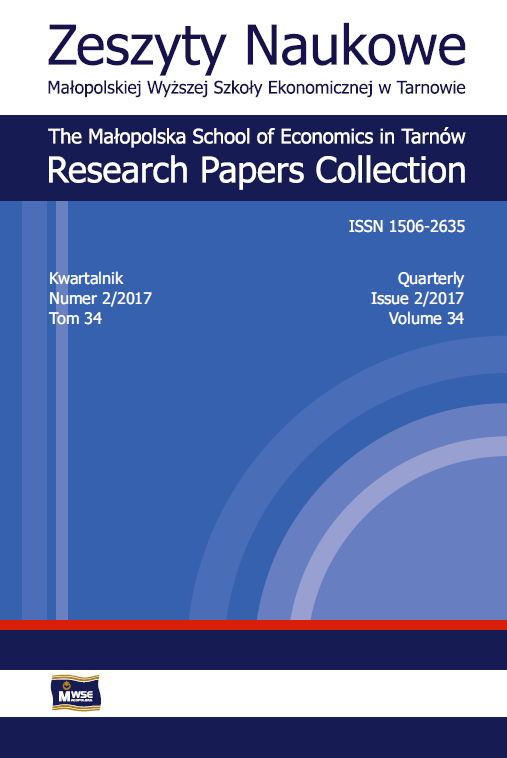Abstract
The article presents the outline of the methodology of the transposition of knowledge management tools into the mechanisms of the owner’s supervision, allowing its effective performance, according to the requirements of the contemporary knowledge-based economy (KBE). Knowledge capital consists of immaterial resources of the firm, not having a physical or financial dimension, contributing to the generation of the stream of future advantages and significantly influencing the value of the firm, and the manner of exercising the supervision over its effective utilisation is the essence of the contemporary corporate governance. The methodology worked out by the authors is based on the application of a new tool, i.e. Corporate Governance Scorecard, concentrating on the process of the identification of knowledge management tools, their operationalisation, qualification of the power of influence and the assignment of measures for the qualification of the effectiveness of supervision. The in-depth analysis of the problems of knowledge management performed in the research process enabled the separation of management components which have relatively the greatest influence on the innovation capacity. It can also be used in the improvement of the owner’s supervision of modern organisations. The basic components of knowledge management which can be used in the improvement of the owner’s supervision in modern organisations are: tools, processes, relations and innovations. The use of the scorecard system enables to execute the transposition of these knowledge management tools aimed at the effects of the fulfilment of aims measured by the measures which are the object of the supervision according to the procedures adequate for their kind, i.e. supervisory mechanisms. The system of exercising the owner’s supervision based on the tool constructed in this way enables to exercise the supervision efficiently based on easily measurable variables expressed in the measures of achieving the success of the effects of each management tool. The final part presents the model of the supervision structure in a company from the area of knowledge based economy, and the case study conducted by the authors presents the essential issues related to the investigated problem.
References
Blair, M.M. (1999). Firm-specific human capital and theories of the firm. W: M.M. Blair, M.J. Roe (eds.). Employees and Corporate Governance. Washington: Brookings Institution Press. ISBN 0815709447.
View in Google Scholar
García-Castro, R., Aguilera, R.V., Ariño, M.A. (2013). Bundles of firm corporate governance practics: A fuzzy set analysis. Corporate Governance: An International Review, 21(4), 390–407.
View in Google Scholar
Goergen, M., Mallin, Ch., Mitleton-Kelly, E., Al-Hawamdeh, A., Hse-Yu Chiu, I. (2010). Corporate Governance and Complexity Theory. Cheltenham: Edward Elgar. ISBN 9781849801041.
View in Google Scholar
Hilami, M.F., Ramayah, T., Mustapha, Y., Pawanchik, S. (2010). Product and process innovativeness: Evidence from Malaysian SME’s. European Journal of Social Science, 16(4), 556–564.
View in Google Scholar
Jerzemowska, M., Campbell, K., Najman, K. (2009). Reminiscencje na temat polskich regulacji nadzoru korporacyjnego. Prace i Materiały Wydziału Zarządzania Uniwersytetu Gdańskiego, 1, 151–165.
View in Google Scholar
Kozioł, L. (2015). Nadzór właścicielski i zarządzanie wiedzą w organizacjach nowoczesnej gospodarki. W: M. Jerzemowska, K. Stańczak-Strumiłło (red.). Współczesne problemy nadzoru korporacyjnego. Gdańsk: Wydawnictwo Uniwersytetu Gdańskiego. ISBN 9788378654094.
View in Google Scholar
Kozioł, L., Barwacz, K. (2016). Koncepcja ładu korporacyjnego sektora przedsiębiorstw komunalnych. Tarnów: Małopolska Wyższa Szkoła Ekonomiczna. ISBN 9788389879240.
View in Google Scholar
Mesjasz, Cz. (2015). Bundles of corporate governance: A preliminary systemic appraisal. W: M. Jerzemowska, K. Stańczak-Strumiłło (red.). Współczesne problemy nadzoru korporacyjnego. Gdańsk: Wydawnictwo Uniwersytetu Gdańskiego. ISBN 9788378654094.
View in Google Scholar
MWSE (2014). Działalność innowacyjna przedsiębiorstw regionu tarnowskiego i Małopolski. Niepublikowany raport z badań prowadzonych w Katedrze Zarządzania Małopolskiej Wyższej Szkoły Ekonomicznej w Tarnowie w latach 2012–2014. Tarnów: Małopolska Wyższa Szkoła Ekonomiczna w Tarnowie. Noga, A. (2009). Teorie przedsiębiorstw. Warszawa: PWE. ISBN 9788320819267.
View in Google Scholar
Nonaka, I., Takeuchi, H. (2000). Kreowanie wiedzy w organizacji: jak spółki japońskie dynamizują procesy innowacyjne. Warszawa: Poltext. ISBN 8386890991.
View in Google Scholar
Standards Australia. (2005). Australian Standard in Knowledge Management: A Guide.
View in Google Scholar
Sveiby, K.E. (1997). The New Organizational Wealth: Managing and Measuring Knowledge Based Assets. San Francisco: Berrett-Koehler Publishers. ISBN 1576750140.
View in Google Scholar
Ward, A.J., Brown, J.A., Rodriguez, D. (2009). Governance bundles, firm performance, and the substitutability and complementarity of governance mechanisms. Corporate Governance: An International Review, 17(5), 646–660.
View in Google Scholar
Williamson, O.E. (1996). The Mechanisms of Governance. Oxford: Oxford University Press. ISBN 0195078241.
View in Google Scholar
© Copyright by Małopolska School of Economics in Tarnów. The articles are available under the Creative Commons Attribution NonCommercial-NoDerivatives 4.0 International License


